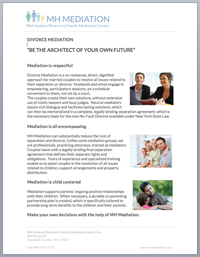High Net Worth Divorces
September 8, 2019
Is yours a high net worth divorce? The U.S. Securities and Exchange Commission (“SEC”) defines a “high-net-worth individual” as an individual with at least $1,000,000 managed by his/her registered investment adviser, or whose net worth the investment adviser reasonably believes exceeds $2,000,000. The net worth of an individual for SEC purposes may include assets held jointly with his or her spouse.
The subjects that need to be dealt with in divorces are the same whether the divorcing spouses are high net worth individuals or not: property distribution, child custody, child support and spousal support (formerly called alimony). Where high net worth cases often differ is in the first and last of these.
New York prescribes spousal support according to a formula that uses the spouses’ respective incomes up to a maximum amount, or “cap” (currently $178,000; this is adjusted annually). If the spouse who is paying spousal support has income over $178,000 yearly, the court has discretion to award more support than the amount calculated using the cap. In high net worth cases, the question becomes “How much more?”.
In deciding how much more, courts are guided by the factors listed below:
- Age and health of the parties
- Present and future earning capacity
- Need of one party for education or training
- Termination of child support before termination of spousal support
- Wasteful dissipation of marital assets, or transferring or encumbering assets unfairly
- Existence and duration of a pre-marital joint household or pre-divorce separate household
- One spouse’s inhibiting the other’s earning capacity or employability
- Availability and cost of medical insurance
- Care of children, stepchildren, disabled adult children and elders that may have inhibited a spouse’s earning capacity
- Tax consequences
- Standard of living during the marriage
- Reduced earning capacity of one spouse by virtue of having forgone or delayed education, training or career opportunities
- Equitable distribution of marital property and income from such property
- Contributions and services as a spouse, parent, wage earner and homemaker to the career or career potential of the other spouse
- Anything else the court finds just and proper
Property distribution in high net worth cases often involves complex and sophisticated assets such as multiple banking, investment and retirement accounts, businesses, real estate both commercial and residential, and unusual compensation structures, to name a few. With these more complex assets may come difficult tax issues, estate planning issues, distribution issues, trusts, and hidden assets. These require experienced lawyers and sometimes financial specialists to handle them properly, as they involve reading and understanding complicated business and financial records. If a document is not truly understood by counsel, that lack of understanding can result in consequences during or after the divorce that may be difficult or impossible to change.
On this website we discuss different processes for getting divorced: litigation, collaboration, mediation. The choice of process is important in any divorce, but can be critical in high net worth cases. In these cases, it is particularly important to consider options in addition to litigation, because it is easy for litigation costs to spiral out of control. It is more than ironic, even tragic, if this results in spouses and children emerging from divorce with less money than they would otherwise have had. If litigation is truly your first or only choice, an experienced lawyer is better able to try and keep a lid on costs.
In conclusion, whether you are the spouse with the business and the real estate, or the spouse who has primarily cared for the children, or a couple who have grown and amassed wealth together, you need to be educated about the nature of your marital assets, potential consequences of various ways of distributing them, and choices for distributing it all fairly without undue litigation costs. Lazar & Schwartz has a combined total of over forty years experience in these areas of practice.
______________________________________
This post was originally published on LazarandSchwartz.com 9/6/16.


